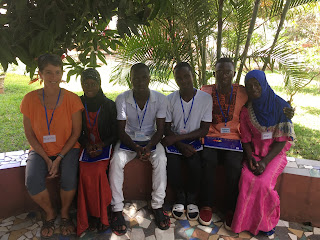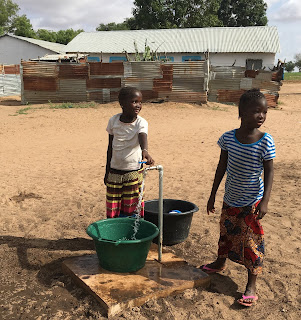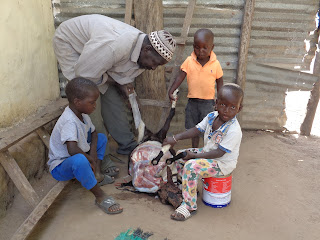It’s been a long time since my last blog post – how did that
happen? I’ve been in Africa for over six months and already it’s starting to
seem like two years is a rather short time. These past two months have been
filled with a lot of Peace Corps trainings and programs that took me away from
my village. It’s great to be eating more normally and hanging out with other
Americans, but it also causes my language skills to decay and leaves me feeling
a bit disconnected with my purpose here. I’m heading back to village later
today, just before the start of Ramadan which begins the evening of June 5th.
I’m sure I’ll have more to say about that later. And I also expect to have more
to say about my water projects soon as well. Both grants (one to bring water
taps into the village and one to improve the water supply for the women’s
garden) are well along in the administrative process. I’m thinking we’ll be in
the construction phase in June, inshallah. If you are interested in reading
more about them and/or contributing to the projects you can find them online
here: www.peacecorps.gov/donate Search
by my last name (tarnow).
 |
| Me with four students and their teacher from the high school near my village. Yassin, Abou, Mousa, Yusupha and Fanna. |
I spent last week in Kombo, the urban area near Banjul, with
20 high school students from five different up-country villages, visiting local
colleges and universities and hearing talks on topics like family planning,
career development, gender equity and scholarship programs. We also heard from
a young man about his experience with The Back Way – i.e., travelling illegally
overland to the Mediterranean coast with the hope of getting to Europe and “a
better life.” He was gone for over a year and had a sad and horrible tale to
tell about his experiences. Prison, beatings, extortion, etc. Many people do
not return. Some make it to Europe and others do not survive the journey. For
many, the motivation to go The Back Way stems from a sense that there are no
opportunities for a better life here in The Gambia. The weeklong program in
Kombo is designed to counteract that thinking. We’ll be working with the
students to bring the message and information back to their fellow students and
their parents.
 |
| Cashew apple with nut |
Spring is cashew season in this region. Have you ever seen a
cashew fruit? The cashew nut grows on the outside of the fruit, aka cashew
apple. The fruit and nut are ready to harvest when they fall to the ground.
Farmers comb the orchards every day to collect the fruits before goats or cows get
to them. I really enjoy cashew apples! They are super juicy and fairly tart. There
isn’t a market for the fruit and they don’t keep well so they are consumed by
the families and/or fed to livestock. The nut is covered by a hard shell that
must be carefully burned off because it contains toxic oils/fumes. The farmers
sell the nuts to food processors who take care of that step.



Comments
Post a Comment